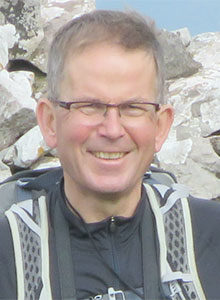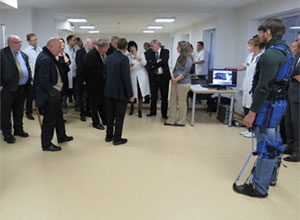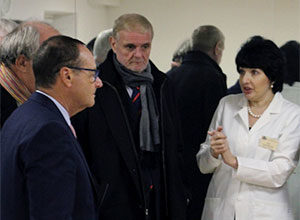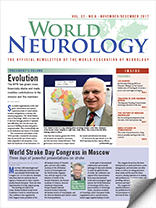Three days of powerful presentations on stroke
By Peter Sandercock, MD, DM, FRCPE, FMedSci, FESO

Peter Sandercock, MD, DM, FRCPE, FMedSci, FESO
More than 2,800 neurologists and other physicians involved in stroke care attended World Stroke Day Congress Oct. 25-27 in Moscow. Attendees were from Moscow and more than 60 regions of Russia and 10 other countries, mostly Eastern European. There also were representatives of stroke support groups.
The meeting was held in the iconic Ukraina Radisson Royal Hotel Conference Center in central Moscow. The conference was organized by Prof. Eugene Gusev, president of the All-Russian Society of Neurologists, and Prof. Alla Guekht, secretary of the All-Russian Society of Neurologists and the World Stroke Organization, with the support of the Ministry of Health of the Russian Federation, the Russian Academy of Sciences, Moscow Healthcare Department, Pirogov Russian National Research Medical University, All-Russian Society of Neurologists, and the Moscow Research and Clinical Center For Neuropsychiatry.
In the spirit of international collaboration and scientific exchange of ideas and solutions to tackle the global burden of stroke, the conference was supported by representatives from major international stroke and neurological organizations: the World Federation of Neurology (WFN), European Academy of Neurology (EAN), American Academy of Neurology (AAN), European Stroke Organization (ESO), and the International League Against Epilepsy (ILAE).
The congress focused on the latest developments in stroke prevention, acute management, and restorative care after stroke, as well as on raising awareness about stroke and the need for better resources, sharing experiences in dealing with problems resulting from stroke, and providing relevant information to stroke survivors and their caregivers.
The congress book contained extended abstracts of all of the talks and was published in English and Russian. The participants of the congress received the book for free. As many doctors in the former Soviet Union know English poorly, these books are extremely valuable for them.
Education Sessions and Symposia

Demonstration of innovative stroke rehab technology at Moscow Research and Clinical Center of Neuropsychiatry.
Day 1: The congress got off to a great start, with the program for the day including sessions on stroke in the young, rehabilitation after stroke, chronic cerebrovascular disease, clinical pharmacology and pharmacotherapy of stroke, current technologies in endovascular treatment of acute ischemic stroke, management of stroke — challenges and solutions, organization of stroke care, and a master class on multiple organ failure in severe stroke.
The WSO members on the faculty who gave talks on Day 1 were Geoff Donnan on “Thrombolysis, Modern State and Perspectives,” Peter Sandercock on “Personalized Medicine: Can it Be Applied in Stroke and Can it Be Tested in Trials?” and Wolfgang Grisold (from WFN) on “Stroke and Cancer.”
Main Scientific Sessions
Day 2: The scientific congress was formally opened by a Praesidium of Representatives of all the key organizations in contributing to the congress, with welcoming words from Parliament of the Russian Federation, Russian Academy of Sciences, local organizers A. Guekht and E. Gusev, and W. Hacke (representing WSO). The ESO was represented by V. Caso, EAN by D. Leys, WFN by W. Grisold, and ILAE by E. Perucca.
It was followed by a series of expert talks from Russian colleagues, covering a wide variety of issues on current stroke care in the region. The afternoon sessions included updates on current standards in stroke diagnosis, the role of neuropsychiatry in stroke, novel opportunities in stroke recovery, thrombolysis, and a masterclass in chromotherapy. There was an important session on cerebrovascular disease in ICD-11 with talks by S. Murasev and E. Salakhov (representatives of the Ministry of Health) on the “Role of the Russian Federation in International Program Against Brain Diseases,” B. Norrving (WSO) on “Stroke as a Brain Disease in ICD-11 – What Does it Mean?”, R. Sacco (AAN) on “Stroke Prevention and Brain Health Support” and V. Caso (ESO) on “Gender Differences in People with Ischemic Stroke.” There also was a key session on post-stroke epilepsy with talks by A. Hauser and S. Moshe from the U.S., Prof. Guekht and E. Perucca (Italy).
Scientific Sessions

Prof. Guekht, Prof. N. Bornstein, and Immediate Past President of WSO Prof. S. Davies discuss stroke rehabilitation.
Day 3: The main plenary session was opened by Prof. Veronika Skvortsova, the Minister of Health, and was followed by the Award of Diploma of the Foreign Members of the Russian Academy of Sciences. This was followed by a series of talks on major stroke topics: “Intravenous Thrombolysis — Is it Still the Most Important and Specific Method of Acute Stroke Therapy?” W. Hacke; “Cognitive Impairment After Stroke Is a Heavy Burden for Patients, Their Families, and Society,” M. Brainin; “Reperfusion Therapy and Ischemic Penumbra,” S. Davis; “Arterial Hypertension and Stroke,” E. Chazov, I. Chasova; “Approaches to Lowering Cardiovascular Disease Mortality in Russia,” S. Boitsov; “Surgical Treatment of Stroke in Russia,” V. Krylov; and “Spinal Cord Circulation Disorders,” A. Skomorets.
This session outlined the great progress that has been made in reducing the burden of stroke and vascular disease over the past decade, but also highlighted the priority actions for the future. Other interesting contributions of the day included sessions on stroke in childhood, ultrasound in diagnosis, “Eye as a Mirror of the Brain,” by N. Bornstein and a session on post-stroke cognitive impairment.
Visit to Moscow Research and Clinical Center For Neuropsychiatry
Prof. Guekht arranged a fascinating and most enjoyable visit for the international faculty to her institution, at which research fellows presented their work on various aspects of cognition, neuroimaging, neuropsychiatry, and rehabilitation. She invited her colleagues and collaborators to attend this meeting and present their institutions, so there was a possibility to get acquainted with the best University Hospitals/Clinical Centers in Moscow: the Clinical Medical Center of the Moscow University of Medicine & Dentistry, Buyanov Moscow City Hospital of the Healthcare Department of Moscow, and others.
This was an excellent opportunity for scientific exchange and discussion. The significant achievements in the Moscow medical system — modern equipment, new technologies, and well-trained doctors — were very impressive; the Buyanov Moscow City Hospital and the Moscow Research and Clinical Center of Neuropsychiatry were the perfect examples. The grounds of the center include new buildings as well as some beautiful historic ones that have been renovated and preserved as monuments to the long scientific heritage of the unit.•
Sandercock is Emeritus Professor of Medical Neurology at the University of Edinburgh, U.K.
